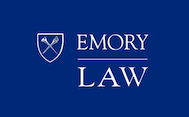
Project on War and Security in Law, Culture and Society: News Releases and In the News


Dudziak: If Obergefell falls, states can govern gay marriage

Dudziak in documentary examining legacy of Black U.S. ambassadors

Dudziak essay cited on mourning, apathy, in a pandemic

Book review: Dudziak's 'Making the Forever War'

Dudziak: Afghanistan reinforces need for U.S. military restraint

First Amendment no defense against Trump’s impeachment, professors say
Three Emory Law faculty--Mary L. Dudziak, Michael J. Perry and Alexander Volokh--joined more than 150 law professors who signed a letter published by the New York Times, which says the First Amendment is no shield for former President Donald Trump at his impeachment trial.

Dudziak: George Floyd and the legacy of racial protest in America
In an essay for Foreign Affairs, Professor Mary L. Dudziak views the current Black Lives Matter protests, and the world's shocked response to George Floyd's killing through the lens of the Civil Rights protests in the 1960s. "And as they did then, U.S. foreign policy leaders today have looked at the global response and considered the effect of the crisis on U.S. foreign relations--worrying that the protests and violent police response, coming on top of the United States' handling of the COVID-19 pandemic and economic downturn, threaten to undermine American strength in the world,” Dudziak writes.

Dudziak: Trump's use of troops damages our reputation abroad
Asa Griggs Candler Professor of Law Mary L. Dudziak writes in the New York Times on the damage President Trump has done to U.S. international relations by using federal troops to squelch protests around the country.

Wartime language surfaces in current crisis, but a pandemic is not a war, Dudziak says
Are there COVID-19 lessons to learn from the dramatic changes to society that defined World War II? In a BBC Future article, Asa Griggs Candler Professor of Law Mary L. Dudziak says a pandemic is not a war.

Dudziak: Unveil secret counsel that influences the president
"The recent saber rattling against Iran raises the question of whether the president can take the country to war on his own," Asa Griggs Candler Professor of Law Mary L. Dudziak writes for The Hill. Much of the legal counsel a president receives comes from the DOJ's Office of Legal Counsel. "But many Office of Legal Counsel opinions remain secret decades after the fact. Because of this, a body of secret law has become a building block of contemporary presidential power," Dudziak says.

Dudziak: Why Congress should challenge Trump on Yemen war
A group of constitutional scholars and lawmakers want House Speaker Nancy Pelosi to take President Donald Trump to the Supreme Court over the war in Yemen. Vox quoted Asa Griggs Candler Professor of Law Mary L. Dudziak on why. It's unconstitutional for a president to unilaterally involve the U.S. in war. "Especially since 9/11, Congress has let power accumulate in the executive branch," Dudziak said. "And Congress does that by sitting back and not objecting, which is why Pelosi's role is really important right now."

Dudziak for the Washington Post: Korea's toxic legacy
"The collapse of talks between President Trump and North Korean leader Kim Jung Un in Hanoi means that Pyongyang's nuclear program will continue--and so, too, will the still unresolved Korean War, now nearly 70 years old," Asa Griggs Candler Professor of Law Mary Dudziak writes in an opinion article for the Washington Post. "The war, which ended with a truce but not a peace treaty, is famously forgotten in the United States, but it is invoked as legal authority every time a president sends U.S. troops overseas without congressional authorization."

2018 will be remembered for cruelty, Dudziak tells Politico
Politico asked 16 historians how the past year will be viewed by coming generations. "2018 will be remembered as the year of cruelty," writes Asa Griggs Candler Professor of Law Mary L. Dudziak. From child deaths at the border to President Trump's refusal to sanction Saudi Arabia for the murder of journalist Jamal Khashoggi, it was a brutal year, Dudziak said. "The list goes on and on--there is too much cruelty for one paragraph. Congress, and the American people, aided the president's cruelty by failing to do whatever it would take to stop him."

Dudziak: 1968 marks a judicial watershed
Asa Griggs Candler Professor of Law Mary Dudziak is quoted in Political News on the end of the Warren U.S. Supreme Court.

Dudziak in the Atlantic: Russian social media tactics = new propaganda
The Internet Research Agency--a Russian "troll factory"--used social media and Google during the 2016 electoral campaign to deepen political and racial tensions in the United States, the Atlantic reports. Except for the technology used, however, these tactics are not exactly new. The Cold War coincided with the beginning of the civil rights movement, and the two became intertwined in how the Soviets used the racial strife. "Early on in the Cold War, there was a recognition that the U.S. couldn't lead the world if it was seen as repressing people of color," Emory Law Professor Mary Dudziak says.

Dudziak keynote: 'American Experience with War and Death'
Asa Candler Griggs Professor of Law Mary Dudziak was featured recently on C-SPAN, delivering the keynote address at the Society for Historians of American Foreign Relations annual meeting, titled, "American Experience with War and Death." Dudziak, a leading U.S. legal historian, is the society's president.

Dudziak for the NY Times: Trump on America's moral authority
Donald Trump's recent comments on whether it's important to press for the rule of law in Turkey illuminate his campaign's 'America First' ideology, Asa Griggs Candler Professor of Law Mary Dudziak writes for the New York Times. "He rejects the idea that American moral leadership matters."

Dudziak for Dissent: Distant conflicts undermine attention to war powers
An Army officer has taken President Barack Obama to court over his the military campaign against ISIS, arguing the war is illegal because Congress has not authorized it. No military draft, reliance on contractors, and high-tech warfare have insulated the American public from the cost and consequences of war, Asa Griggs Candler Professor of Law Mary Dudziak writes. "Without a personal stake, Americans pay little attention to their country's ongoing wars. Presidents no longer need to wait for an attack on Americans to galvanize public support for armed conflict."

How would Trump handle a terrorist attack? Poorly, Dudziak tells Politico
Politico asked historians and foreign policy experts to project how candidate Donald Trump would handle a 9/11-type attack as president. "In light of Donald Trump's tendency to react to problems by blaming minority groups, including Muslims, and promoting torture, we might expect more of the same, perhaps at a greater volume, than we've seen so far," Asa Griggs Candler Professor of Law Mary Dudziak said. "That would serve Trump and the nation poorly. The way the United States treats minority groups has had an impact on U.S. foreign relations in the past, and would be a problem in a Trump presidency."

Dudziak for Politico: Obama can learn from George Washington
Politico asked several historians, "Which president had the best last year in office?" Emory Law Professor Mary Dudziak says President George Washington made a powerful choice in not seeking a third term (which is now a constitutional requirement). Obama can lead by choosing not to act, she says. "Instead of bypassing Congress, if Obama refused to project American military force in Iraq, Syria or elsewhere without an authorization from Congress, it would set a striking example and serve as a powerful legacy," Dudziak writes.

Dudziak named prestigious Library of Congress Kluge Chair
Mary L. Dudziak, Asa Griggs Candler Professor of Law and Director of the Project on War and Security in Law, Culture and Society will hold the Kluge Chair in American Law and Governance at the Library of Congress this fall.

Dudziak cited in Foreign Policy: "There's no such thing as peacetime"
"We've spent years believing the war on terror will end and civil liberties will be safe again. It's time to accept that the war will go on forever--and take steps to protect life and liberty in the new normal," Georgetown Law Professor Rosa Brooks writes in Foreign Policy. She cites Emory Law Professor Mary Dudziak's recent book, War Time, to illustrate how ceaseless war affects individual liberties in the context of national security imperatives.

Dudziak in the Atlantic on Clinton's use of personal e-mail as secretary of state
Hillary Clinton's failure to use a government e-mail address during her four-year tenure at the State Department "may have violated federal requirements that officials' correspondence be retained as part of the agency's record. "Hillary Clinton's emails are the contemporary equivalent of letters and memos from past secretaries of state that have enabled historians to study the history of American foreign relations," said Asa Griggs Candler Professor of Law Mary L. Dudziak.

Dudziak in Newsweek: Police death cases hurt U.S. foreign policy
In a parallel to the black eye civil rights abuses gave the U.S. abroad in the '60s, America's race problems are again front-page news, from London to Baghdad, Beijing to Tehran. Russia, China and ISIS are all crowing about American "hypocrisy" in social media. "Obama needs to present [racial discrimination] as one of the nation's most pressing and urgent problems," said Asa Griggs Candler Professor of Law Mary Dudziak. "We can't pursue a human rights agenda abroad if we're not protecting them at home."

LA Times op-ed cites Dudziak on U.S. decision to go to war, again
"For American purposes, war as a political tool has more and more demonstrated its inability to deliver," writes West Point Professor Gregory Daddis. "In truth, decisiveness in war has historically been elusive, especially in the decades following the end of World War II. If war provides meaning, why, as Emory Law Professor Mary Dudziak asks, does military engagement no longer require 'the support of the American people but instead their inattention?'"

Keeping the peace, distancing ourselves from war
Mary L. Dudziak works to answer how political restraints on war have atrophied over time in her upcoming book.

Carnegie Council: Dudziak on civil liberties during wartime
Asa Griggs Candler Professor of Law Mary Dudziak discusses how wartime laws and policy often live beyond the present conflict, to have lasting effects upon civil liberties. Starting with World War I, she examines how overseas wars can deeply affect individual rights at home, in a Q & A with Carnegie Council Associate Editor for Ethics & International Affairs Zach Dorfman.

Dudziak in Foreign Affairs: Ferguson from afar
As the turmoil in Ferguson, Missouri, unfolds, questions about the United States' commitment to human rights are once more headlining news coverage around the world. The uncomfortable international spotlight on such domestic problems should not be surprising. American racial inequality regularly dominated foreign news coverage during the 1950s and 1960s. Strong presidential leadership was needed to address earlier civil rights crises. It helped repair the damage to the American image, and undercut the argument that the United States was hypocritical in promoting human rights. Then, as now, protecting rights serves U.S. international relations.

Ex-Pats abroad supported March on Washington, Dudziak writes in NYTimes
An important but little-known episode in the story of the March on Washington unfolded on Aug. 17, 1963, in a Paris nightclub called the Living Room. James Baldwin and others living abroad met to support the upcoming March on Washington.

Dudziak for CNN: Fisher ruling leaves courts "outsized role" in setting policy
When the Supreme Court on Monday sent Fisher v. University of Texas, an affirmative action case, back to the lower court for a second look, supporters of race-conscious policies breathed a sigh of relief.

Legal scholar reframes the question to find an answer
Mary L. Dudziak thinks that to get to the heart of a matter -- in law and in scholarship -- it can be helpful to start at the edges. To understand domestic law, she looks to its global impact; to understand contemporary war, she looks to its past.

Dudziak op-ed in New York Times: "Obama's Nixonian Precedent"
Nixon's secret bombing campaign in Cambodia is used to justify Obama's targeted killing of Americans suspected of terrorism.

Dudziak: Obama Declares "Decade of War is Ending" But Covert War Continues
The leak of a White Paper on targeting killings is getting the expected attention from law bloggers and others, with much commentary focused on whether the legal analysis is correct, for example the definition of "imminence."

Dudziak in Democracy: "Governing the World: The History of an Idea"
Will there be "but one heart to the globe?" asks Walt Whitman in a poem that provides an epigraph in Mark Mazower's new book, Governing the World: The History of an Idea. At the center of this expansive work is the question of how Americans and Europeans have imagined the world, its peoples, and its nations. Is there but one global identity, as Whitman surmises?

Dudziak challenges Defense Department definition of ending war with Al Qaeda
We are not tipping from war to peace, if peace is understood as the absence of warfare. Instead, we are sharpening the weapon. This enables warfare to be more precise, more targeted, more secret, more isolated from public awareness and accountability. In this way tipping the war on terror may not bring about an ending, but instead facilitate an ongoing war.

Professor Dudziak examines the impact of war on law and democracy
War and peace aren't easily defined, Mary L. Dudziak says in her new book, War Time: An Idea, Its History, Its Consequences.